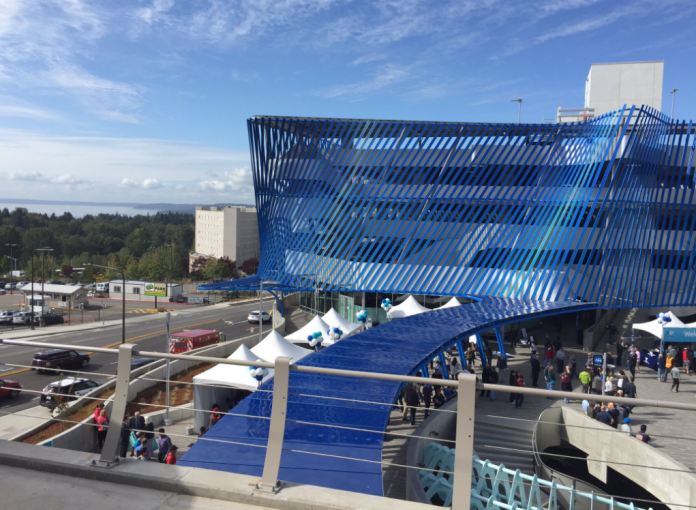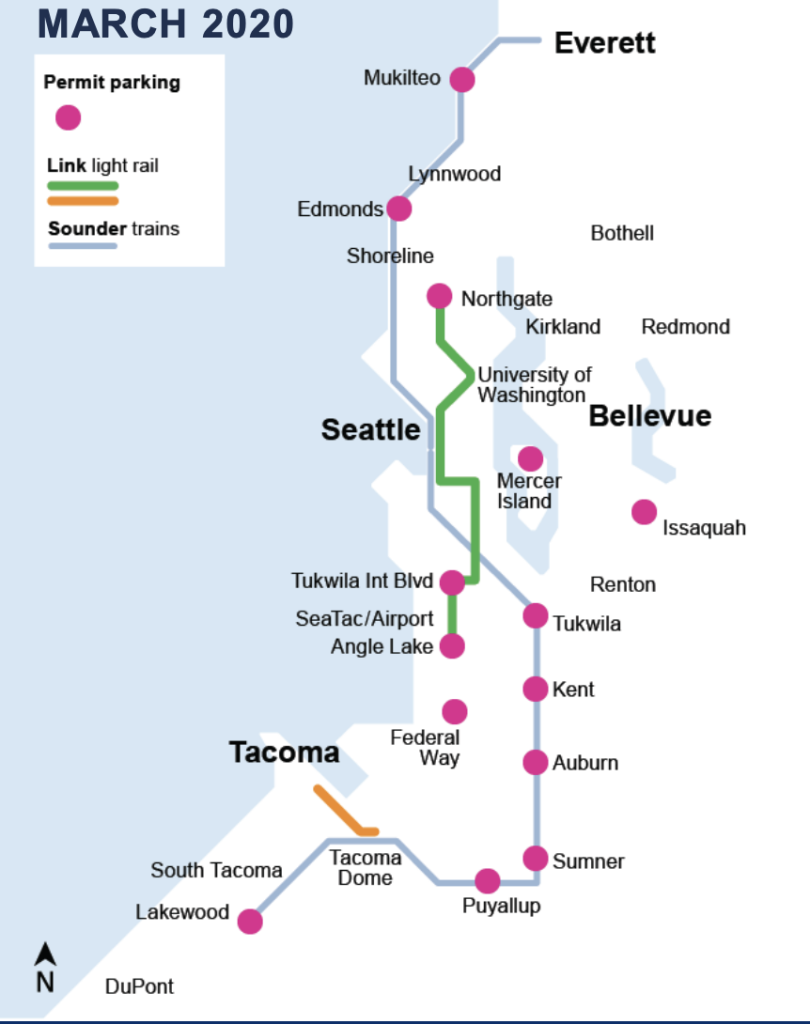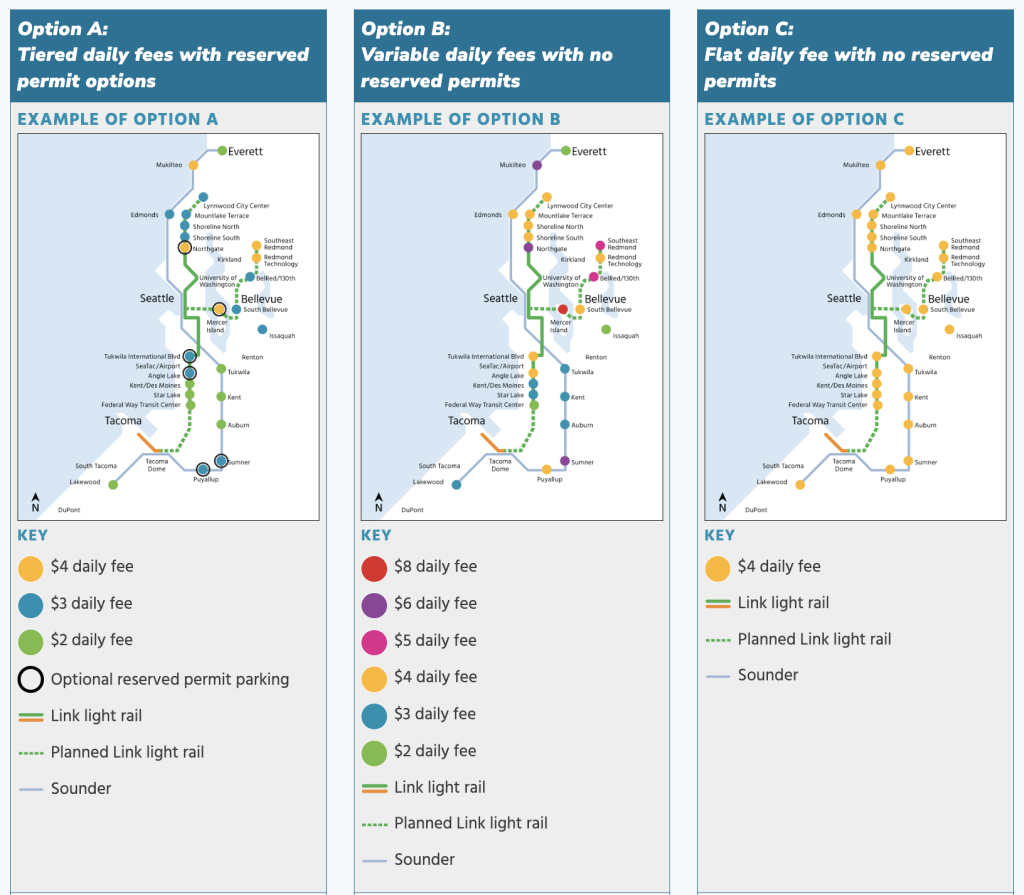
Sound Transit has outlined several alternatives to expand its parking management program with paid parking. Some or all stations with parking could be affected by the changes in the next year. Exactly what the program will look like is still up to debate with agency boardmembers having wide-ranging opinions on the matter and an online open house gathering public feedback.
Sound Transit’s experience with parking management and parking demand
Over the past decade, Sound Transit’s parking management program has slowly evolved. Initially, the agency board adopted a station access policy in 2013. That led to the agency offering monthly carpool (HOV) parking permits as a free service. Then in 2019, the agency began offering monthly paid parking permits for single occupancy vehicles (SOVs). The cost for those SOV permits ranged between $45 to $120 per month, depending upon location.
Just before the pandemic, Sound Transit had about 1,200 permitholders participating in the parking management program across 14 locations. The pandemic, however, forced Sound Transit to fully suspend its parking management program, just as it was getting into the swing of things, since overall use of parking facilities collapsed overnight. Then in 2022, the agency felt confident enough to reinstitute it as ridership began to recover, albeit slowly.
Permit parking locations are only at Sound Transit-owned facilities and primarily at Link light rail and Sounder commuter rail stations, though there are some at non-rail facilities. Current policy parameters further stipulate that parking management can only happen at Link facilities or where parking utilization is over 90% and that permit parking is limited 50% of a facility’s parking spaces.
Systemwide, parking utilization remains fairly low at 43% as of June — a far cry from 90% parking utilization recorded in June 2019. Consequently, Sound Transit staff caution that the demand for monthly parking permits may continue to be lower.
Parking demand differs significantly from location to location and day to day due to changes in work habits. White collar workers, for instance, tend to commute less than prior to the pandemic but still turn up in large numbers on Tuesdays, Wednesdays, and Thursdays. Hence, daily parking rates may be a sensible approach to manage parking.
Despite low systemwide parking utilization, Sound Transit is seeing a steady increase in demand and some like facilities at Northgate and Tukwila International Boulevard are routinely seeing utilization rates over 90%.
Taking stock of peer agency programs
Sound Transit staff have taken stock of how other transit systems are running parking management programs.
WMATA in the Washington, D.C. area offers a very dynamic program with daily paid parking rates varying by location and whether or not a driver is validated transit rider. The agency also offers reserved parking for monthly permitholders. Los Angeles Metro’s program is simpler with no reserved parking but daily parking rates ranging from $2 to $3. Similarly, Denver’s RTD has a simple program with $4 daily parking rates, though riders with in-district license plates can park for free for the first 24 hours. Reserved parking is also available daily until 10:00am for in-district riders who pay a $15 monthly fee. And in the San Francisco Bay Area, BART daily parking rates apply until 3:00pm and very slightly around $3. Riders can also get monthly and single- or multi-day reserved parking for higher rates.
Sound Transit staff say that some big takeaways from peer agencies is that paid parking programs usually apply to all parking facilities and that mobile payments are accepted and encouraged.
What Sound Transit is contemplating and board feedback
In a series of conversations with Sound Transit boardmembers last month, agency staff explained the paid parking approach they are evaluating.
“There are elements of the program we expect to continue, including the performance-based nature of the program — the delegation of rate setting to the CEO and maintaining discounts for certain passenger categories,” said Alex Krieg, a Sound Transit station access planner. “There are elements of an expanded program that need board authorization, including allowing for management at all spaces, reconsidering facility eligibility criteria, authorizing permit types beyond monthly permits, and whether monthly or reserved parking should be offered.”
Krieg outlined three broad alternatives for an expanded parking management program, but noted that a hybrid of alternatives features would likely make it into a final staff recommendation.
| Program Feature | Alternative A | Alternative B | Alternative C |
| Reserved Parking | Yes | No | No |
| Pricing | Variable, differs by location and uses pricing tiers | Variable, differs by location, uses demand-based pricing to ensure some available spaces, and uses more pricing tiers | Flat |
| Fee Types | Daily + Monthly | Daily | Daily |
| Location | All Link stations and some locations | All locations | All locations |
| Potential Fees | $2 to $4 per day, $45 to $120 per month | $2 to $10 per day | $4 per day |
| Rider Impact | More ridership | More ridership | Lower ridership |
Any program that is selected would start simple and be adjusted as needed. Certain rider categories, such as those who are low-income or carpooling, would see pricing discounts.
In response to the alternatives, feedback from Sound Transit board members was varied.
Tacoma Deputy Mayor Kristina Walker said that she agreed with charging for parking, particularly as a way to incentivize people not to drive, but that the context of parking locations should matter in how paid parking is structured. She pointed to a need to be sensitive where an agency transit facility is heavily car-dependent because of few or no other local transit connections and poor local access. Given the nature of transit demand now with greater hybrid work schedules, Walker said that a flat fee would be unwise with parking demand varying greatly during the week.
Fife Mayor Kim Roscoe said her priorities in adjusting the parking management program are growing ridership and ensuring parking availability. She said as a transit rider that her big frustration prior to the pandemic was not being able to reliably get a parking space when showing up to a transit facility.
Christine Frizzell, a suburban mayor from Lynnwood, balked at the notion of charging SOV drivers a variable rate. She pointed to her frustration with market-based pricing when going to a Mariners game.
Nancy Backus, a suburban mayor from Auburn, danced around saying that she didn’t want to charge for parking in Auburn because Sounder service levels are so low. This year, however, she backed authorizing $360 million for more unneeded parking at Sounder facilities — money that could have bought tons more Sounder and local bus service for her community.
Roger Millar, the state transportation secretary, eluded to the fact that he thinks the agency puts too much funding into car parking. He said that the agency should consider a pricing structure that treats riders within and outside the Sound Transit taxing district differently and that the agency should look at installing more covered and secured bike parking.
And Claudia Balducci, a member of the King County Council, said that the agency should be flexible in paid parking by location, but that fees should be variable instead of flat rate to encourage ridership. She also said that some reserved parking would be sensible to encourage riders to become regular transit riders.
Over the next month, Sound Transit will focus on rider engagement to inform how the agency develops an expanded parking management program. And then this winter, the agency board will be tasked with considering and approving a staff recommendation to implement it.
An online open house is available to provide feedback on proposed alternatives.
Stephen is a professional urban planner in Puget Sound with a passion for sustainable, livable, and diverse cities. He is especially interested in how policies, regulations, and programs can promote positive outcomes for communities. With stints in great cities like Bellingham and Cork, Stephen currently lives in Seattle. He primarily covers land use and transportation issues and has been with The Urbanist since 2014.




